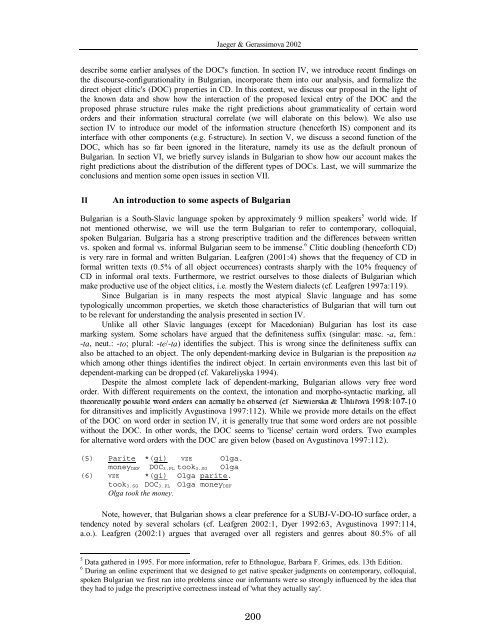Proceedings of the LFG 02 Conference National Technical - CSLI ...
Proceedings of the LFG 02 Conference National Technical - CSLI ...
Proceedings of the LFG 02 Conference National Technical - CSLI ...
Create successful ePaper yourself
Turn your PDF publications into a flip-book with our unique Google optimized e-Paper software.
Jaeger & Gerassimova 20<strong>02</strong><br />
describe some earlier analyses <strong>of</strong> <strong>the</strong> DOC's function. In section IV, we introduce recent findings on<br />
<strong>the</strong> discourse-configurationality in Bulgarian, incorporate <strong>the</strong>m into our analysis, and formalize <strong>the</strong><br />
direct object clitic's (DOC) properties in CD. In this context, we discuss our proposal in <strong>the</strong> light <strong>of</strong><br />
<strong>the</strong> known data and show how <strong>the</strong> interaction <strong>of</strong> <strong>the</strong> proposed lexical entry <strong>of</strong> <strong>the</strong> DOC and <strong>the</strong><br />
proposed phrase structure rules make <strong>the</strong> right predictions about grammaticality <strong>of</strong> certain word<br />
orders and <strong>the</strong>ir information structural correlate (we will elaborate on this below). We also use<br />
section IV to introduce our model <strong>of</strong> <strong>the</strong> information structure (henceforth IS) component and its<br />
interface with o<strong>the</strong>r components (e.g. f-structure). In section V, we discuss a second function <strong>of</strong> <strong>the</strong><br />
DOC, which has so far been ignored in <strong>the</strong> literature, namely its use as <strong>the</strong> default pronoun <strong>of</strong><br />
Bulgarian. In section VI, we briefly survey islands in Bulgarian to show how our account makes <strong>the</strong><br />
right predictions about <strong>the</strong> distribution <strong>of</strong> <strong>the</strong> different types <strong>of</strong> DOCs. Last, we will summarize <strong>the</strong><br />
conclusions and mention some open issues in section VII.<br />
II An introduction to some aspects <strong>of</strong> Bulgarian<br />
Bulgarian is a South-Slavic language spoken by approximately 9 million speakers 5 world wide. If<br />
not mentioned o<strong>the</strong>rwise, we will use <strong>the</strong> term Bulgarian to refer to contemporary, colloquial,<br />
spoken Bulgarian. Bulgaria has a strong prescriptive tradition and <strong>the</strong> differences between written<br />
vs. spoken and formal vs. informal Bulgarian seem to be immense. 6 Clitic doubling (henceforth CD)<br />
is very rare in formal and written Bulgarian. Leafgren (2001:4) shows that <strong>the</strong> frequency <strong>of</strong> CD in<br />
formal written texts (0.5% <strong>of</strong> all object occurrences) contrasts sharply with <strong>the</strong> 10% frequency <strong>of</strong><br />
CD in informal oral texts. Fur<strong>the</strong>rmore, we restrict ourselves to those dialects <strong>of</strong> Bulgarian which<br />
make productive use <strong>of</strong> <strong>the</strong> object clitics, i.e. mostly <strong>the</strong> Western dialects (cf. Leafgren 1997a:119).<br />
Since Bulgarian is in many respects <strong>the</strong> most atypical Slavic language and has some<br />
typologically uncommon properties, we sketch those characteristics <strong>of</strong> Bulgarian that will turn out<br />
to be relevant for understanding <strong>the</strong> analysis presented in section IV.<br />
Unlike all o<strong>the</strong>r Slavic languages (except for Macedonian) Bulgarian has lost its case<br />
marking system. Some scholars have argued that <strong>the</strong> definiteness suffix (singular: masc. -a, fem.:<br />
-ta, neut.: -to; plural: -te/-ta) identifies <strong>the</strong> subject. This is wrong since <strong>the</strong> definiteness suffix can<br />
also be attached to an object. The only dependent-marking device in Bulgarian is <strong>the</strong> preposition na<br />
which among o<strong>the</strong>r things identifies <strong>the</strong> indirect object. In certain environments even this last bit <strong>of</strong><br />
dependent-marking can be dropped (cf. Vakareliyska 1994).<br />
Despite <strong>the</strong> almost complete lack <strong>of</strong> dependent-marking, Bulgarian allows very free word<br />
order. With different requirements on <strong>the</strong> context, <strong>the</strong> intonation and morpho-syntactic marking, all<br />
���¢�����������������������¦�������������������������������������������������������������������������������������¦����������������������������� ���¢���������������¨� -10<br />
for ditransitives and implicitly Avgustinova 1997:112). While we provide more details on <strong>the</strong> effect<br />
<strong>of</strong> <strong>the</strong> DOC on word order in section IV, it is generally true that some word orders are not possible<br />
without <strong>the</strong> DOC. In o<strong>the</strong>r words, <strong>the</strong> DOC seems to 'license' certain word orders. Two examples<br />
for alternative word orders with <strong>the</strong> DOC are given below (based on Avgustinova 1997:112).<br />
(5) Parite *(gi) VZE Olga.<br />
moneyDEF DOC3.PL took3.SG Olga<br />
(6) VZE *(gi) Olga parite.<br />
took3.SG DOC3.PL Olga moneyDEF<br />
Olga took <strong>the</strong> money.<br />
Note, however, that Bulgarian shows a clear preference for a SUBJ-V-DO-IO surface order, a<br />
tendency noted by several scholars (cf. Leafgren 20<strong>02</strong>:1, Dyer 1992:63, Avgustinova 1997:114,<br />
a.o.). Leafgren (20<strong>02</strong>:1) argues that averaged over all registers and genres about 80.5% <strong>of</strong> all<br />
5 Data ga<strong>the</strong>red in 1995. For more information, refer to Ethnologue, Barbara F. Grimes, eds. 13th Edition.<br />
6 During an online experiment that we designed to get native speaker judgments on contemporary, colloquial,<br />
spoken Bulgarian we first ran into problems since our informants were so strongly influenced by <strong>the</strong> idea that<br />
<strong>the</strong>y had to judge <strong>the</strong> prescriptive correctness instead <strong>of</strong> 'what <strong>the</strong>y actually say'.<br />
200





